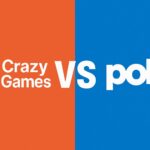A few years ago, I was sitting in my university library, staring at my laptop. My to-do list was screaming at me, but my brain felt like a buffering YouTube video. Out of sheer desperation, I opened a quick puzzle game just to “wake up” my brain. Fifteen minutes later, I was back in the zone, ticking off tasks like a machine.
That was the moment I realized—games aren’t just for entertainment. The right kind of game can be a mental espresso shot. Whether you’re a student drowning in assignments or a professional trying to power through an afternoon slump, focus boosting games can be a secret weapon.
The best part? They’re fun. You’re not forcing yourself to do a boring brain exercise; you’re enjoying yourself while improving reaction time, memory, and mental clarity.
In this guide, I’ll share some of my favorite focus-friendly games, why they work, and how to use them without letting them become distractions.
Why Focus Boosting Games Work
Let’s get one thing clear—playing “any” game won’t automatically help you focus. Some games are pure chaos and can leave your brain fried. But games designed around problem-solving, pattern recognition, timing, and memory can stimulate the parts of your brain that handle concentration and mental stamina.
When I first started incorporating games into my work breaks, I noticed something: the best results came from short, intense play sessions. Ten to fifteen minutes of a focus game acted like a reset button. My mind felt refreshed, and I could jump back into work with sharper attention.
For students, these games are great between study sessions to prevent burnout. For professionals, they can replace the endless scroll through social media during coffee breaks.
Lumosity – The All-in-One Brain Gym
Lumosity is one of the most well-known names in brain training, and for good reason. It’s not a single game but a collection of mini-games targeting different mental skills—focus, problem-solving, memory, and flexibility.
When I played Lumosity regularly, I noticed my ability to filter out distractions during study sessions improved. Games like “Train of Thought,” where you direct colored trains to their correct stations, force you to focus on multiple moving pieces at once. It’s surprisingly addictive and mentally exhausting in the best way.
The key with Lumosity is consistency. Playing three to five mini-games daily for a few weeks produces noticeable results.
Sudoku – Old School but Timeless
Sudoku might not have flashy graphics or sound effects, but it’s a powerhouse for concentration. It demands pattern recognition, logical thinking, and sustained focus.
I started playing Sudoku during morning coffee instead of scrolling news feeds. That small change made a difference in how quickly my brain “warmed up” for the day. Plus, you can adjust difficulty—easy puzzles for a light mental stretch, harder ones when you’re ready for a challenge.
It’s also portable—whether on paper or through countless apps, Sudoku is always available.
Chess – The Master of Strategic Thinking
If Sudoku is a sprint, chess is a marathon. It’s the kind of game that forces you to think several steps ahead while anticipating your opponent’s moves.
When I first got into online chess during lockdown, I found my focus muscles getting stronger. I became better at holding multiple scenarios in my head and making decisions under time pressure. The concentration needed to avoid blunders translates well into work and study environments.
For maximum benefit, I recommend timed games—blitz or rapid modes keep you sharp without letting matches drag on forever.
Focus – A Minimalist Concentration Game
“Focus” is one of those deceptively simple browser games. You’re given visual or auditory patterns to memorize and repeat. The catch? The game speeds up as you go, and distractions pop up to throw you off.
I stumbled on it while procrastinating (ironically) and ended up using it as a warm-up before writing sessions. Five minutes of this game made it easier to block out random noises in my apartment.
It’s perfect for a quick, intense mental workout.
Elevate – Focus Meets Communication Skills
Elevate is similar to Lumosity but adds a twist—it also trains reading comprehension, vocabulary, and listening skills. If your job or studies involve a lot of reading or writing, this can be a double win.
One game I love is “Processing Speed,” where you quickly sort words or numbers into categories. It’s simple but gets your brain firing on all cylinders.
I’ve also noticed that Elevate’s short daily challenges fit nicely into a lunch break without feeling like a chore.
TypingClub – For Mind-Body Coordination
Typing may not sound like a focus booster, but hear me out—fast, accurate typing requires total attention, hand-eye coordination, and rhythm.
I started using TypingClub during slow afternoons at work. The game-like progress tracking kept me coming back, and I realized my ability to focus on repetitive tasks improved. Plus, better typing speed makes everything else you do on a computer faster.
It’s also great for reducing the mental “lag” when transferring thoughts into words.
Pattern Memory – Training Your Visual Recall
Pattern Memory games challenge you to remember and replicate sequences of shapes, colors, or positions. They’re quick to play and highly addictive.
I play these when I feel mentally scattered. Focusing on reproducing a pattern forces my mind to lock in and tune out everything else. It’s like giving your brain a single, simple mission—and completing it feels oddly satisfying.
Flow Free – Connecting Without Overthinking
Flow Free looks easy at first—connect matching colored dots without overlapping lines. But once the grid size increases, you need real concentration to solve puzzles efficiently.
When I played during commute breaks, I noticed something interesting: my problem-solving speed improved. I became quicker at visualizing solutions before acting, which helped in both project planning and essay writing.
It’s colorful, calming, and challenging all at once.
Comparison Table – My Picks for Focus Boosting Games
| Game Name | Type | Best For | Avg. Session Time | My Focus Boost Score (1–10) |
|---|---|---|---|---|
| Lumosity | Brain training | All-round mental sharpness | 10–15 min | 9.5 |
| Sudoku | Logic puzzle | Pattern recognition, sustained focus | 10–30 min | 9 |
| Chess | Strategy | Strategic planning, long-term thinking | 5–20 min | 9.2 |
| Focus | Minimalist game | Distraction filtering, quick reactions | 5–10 min | 8.8 |
| Elevate | Brain training | Focus + language skills | 10–15 min | 9.1 |
| TypingClub | Skill training | Coordination, accuracy, speed | 10–20 min | 8.7 |
| Pattern Memory | Memory game | Visual recall, short-term concentration | 5–10 min | 8.9 |
| Flow Free | Puzzle | Visualization, problem-solving | 5–15 min | 8.8 |
How to Use Focus Boosting Games Without Getting Distracted
The biggest danger with any game—especially if you’re competitive—is losing track of time. The key is controlled play sessions. I set a timer for 10–15 minutes and treat it like a coffee break. When the timer goes off, I close the game, no matter how tempted I am to keep going.
Another trick is using these games between tasks, not during them. For example, I might finish writing a section of a report, then reward myself with a few rounds of a focus game before starting the next section.
The Science Behind the Boost
Studies have shown that short bursts of engaging mental activity can improve working memory, processing speed, and sustained attention. Games that require constant decision-making or pattern recognition activate the prefrontal cortex—the part of the brain responsible for focus.
But it’s not just about the brain; it’s about mood. Games release dopamine, the “feel-good” chemical, which can reduce mental fatigue. That’s why a quick game session often feels more refreshing than mindlessly scrolling through social media.
Final Thoughts – Play With Purpose
Focus boosting games aren’t a replacement for good sleep, healthy eating, or time management—but they’re a fantastic tool in the productivity toolbox. For me, they’ve been a game-changer (pun intended) during study marathons and tight work deadlines.
The trick is to choose games that challenge you without overwhelming you, and to keep sessions short. Think of it as a mental warm-up or reset, not a full workout.
So the next time your brain feels like it’s running on 2% battery, skip the extra cup of coffee. Open a game like Lumosity, Sudoku, or Flow Free, and give your mind a quick, enjoyable tune-up.
Your focus will thank you.


